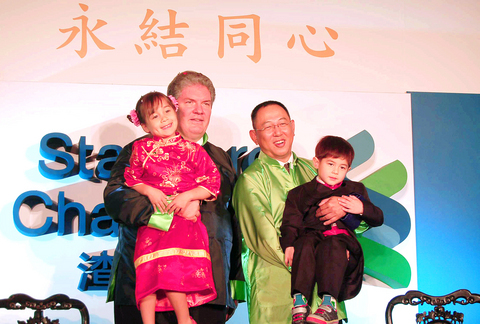Following its acquisition late last year, Hsinchu International Bank (
The name change will be submitted for approval at Hsinchu International's annual general meeting on May 21.
Hsinchu International's incumbent chairman and president Wu Chih-wei (

PHOTO: YANG YA-MIN, TAIPEI TIMES
James McCabe, current chief executive officer (CEO) of Standard Chartered's Taiwan branch, would also retain his title in the merged bank and oversee daily operations, Wu said yesterday at a press briefing.
The new name represents the combination of Hsinchu International's strong regional branch presence with Standard Chartered's international network and financial services to link Taiwanese customers to the rest of the world, Kai Nargolwala, executive director of Standard Chartered group, said in a statement.
The takeover marks the nation's first foreign buyout of a local lender, boosting the British banking group's number of local outlets from three to 86. The move has also driven other international banks in the country, including Citibank, to seek expansion through mergers and acquisitions.
Standard Chartered expects to see rising profitability in the wake of the merger.
"The combination of [the two banks'] business will result in greater profits and broader growth momentum," McCabe said, while declining to elaborate on forecast growth figures.
Standard Chartered incurred a loss of NT$3.3 billion last year in the wake of the consumer credit abuse problem. This compared with profits of NT$1.15 billion in 2005, the Financial Supervisory Commission's data showed.
Hsinchu International posted a huge loss of NT$5.45 billion last year, compared with profits of NT$3.26 billion a year earlier, the commission's data showed.

‘SWASTICAR’: Tesla CEO Elon Musk’s close association with Donald Trump has prompted opponents to brand him a ‘Nazi’ and resulted in a dramatic drop in sales Demonstrators descended on Tesla Inc dealerships across the US, and in Europe and Canada on Saturday to protest company chief Elon Musk, who has amassed extraordinary power as a top adviser to US President Donald Trump. Waving signs with messages such as “Musk is stealing our money” and “Reclaim our country,” the protests largely took place peacefully following fiery episodes of vandalism on Tesla vehicles, dealerships and other facilities in recent weeks that US officials have denounced as terrorism. Hundreds rallied on Saturday outside the Tesla dealership in Manhattan. Some blasted Musk, the world’s richest man, while others demanded the shuttering of his

ADVERSARIES: The new list includes 11 entities in China and one in Taiwan, which is a local branch of Chinese cloud computing firm Inspur Group The US added dozens of entities to a trade blacklist on Tuesday, the US Department of Commerce said, in part to disrupt Beijing’s artificial intelligence (AI) and advanced computing capabilities. The action affects 80 entities from countries including China, the United Arab Emirates and Iran, with the commerce department citing their “activities contrary to US national security and foreign policy.” Those added to the “entity list” are restricted from obtaining US items and technologies without government authorization. “We will not allow adversaries to exploit American technology to bolster their own militaries and threaten American lives,” US Secretary of Commerce Howard Lutnick said. The entities

Minister of Finance Chuang Tsui-yun (莊翠雲) yesterday told lawmakers that she “would not speculate,” but a “response plan” has been prepared in case Taiwan is targeted by US President Donald Trump’s reciprocal tariffs, which are to be announced on Wednesday next week. The Trump administration, including US Secretary of the Treasury Scott Bessent, has said that much of the proposed reciprocal tariffs would focus on the 15 countries that have the highest trade surpluses with the US. Bessent has referred to those countries as the “dirty 15,” but has not named them. Last year, Taiwan’s US$73.9 billion trade surplus with the US

Prices of gasoline and diesel products at domestic gas stations are to fall NT$0.2 and NT$0.1 per liter respectively this week, even though international crude oil prices rose last week, CPC Corp, Taiwan (台灣中油) and Formosa Petrochemical Corp (台塑石化) said yesterday. International crude oil prices continued rising last week, as the US Energy Information Administration reported a larger-than-expected drop in US commercial crude oil inventories, CPC said in a statement. Based on the company’s floating oil price formula, the cost of crude oil rose 2.38 percent last week from a week earlier, it said. News that US President Donald Trump plans a “secondary